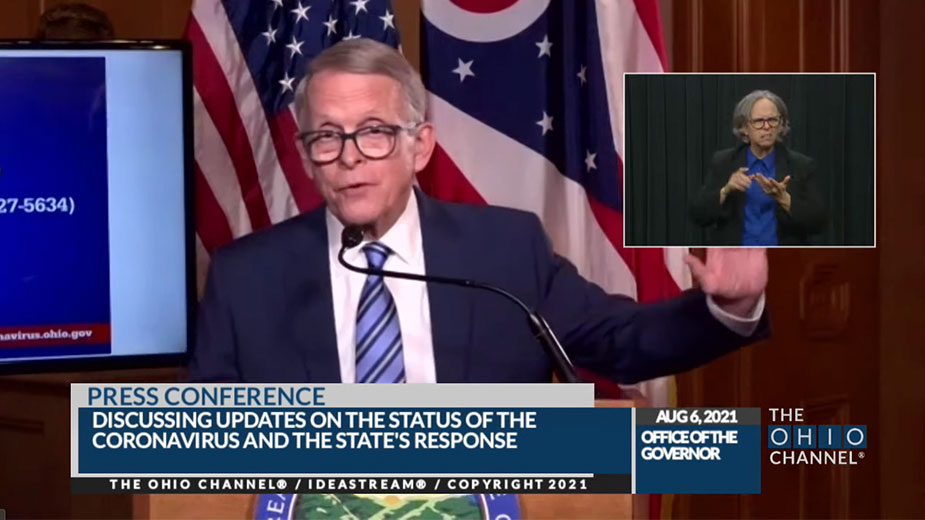DeWine: Delta Variant Has Created Two Ohios
YOUNGSTOWN, Ohio — During a special press event Friday, Gov. Mike DeWine addressed increased cases of COVID-19 in the state and the status of vaccinations among Ohioans.
In short, he identified Ohio as a state with two types of people.
“Those vaccinated, who are safe,” he said, “and sadly those who are not vaccinated who are not safe.”
Of those adults aged 18 and older who are eligible to receive the vaccine, 40% remain unvaccinated, the governor said.
According to the most recent dashboard at Coronavirus.Ohio.gov – which is updated daily by the Ohio Department of Health – 49.73% of Ohioans have at least one dose of a COVID-19 vaccine. That includes 46.31% who are fully vaccinated.
Unvaccinated Ohioans comprise a strong majority of the increasing number of individuals hospitalized because of COVID-19. Since January, 18,662 individuals have been hospitalized because of COVID-19. Of those, 98.4% or 18,367 were not fully vaccinated, compared to 295 who were, DeWine reported.
“Just a stark, stark difference,” he said. “Making it more dangerous for those who are not vaccinated is the emergence of the delta variant.”
The most recent data – July 4 through July 17 – report that 86.47% of lab sequence cases were of the delta variant, up from less than 1% of such cases in May, he reported.
The U.S. and the rest of the world are seeing “examples of exponential growth of COVID-19,” said ODH Chief Medical Officer Dr. Bruce Vanderhoff. Recent surges in Florida have some hospitals there choosing to postpone elective surgeries, he said.
“We don’t want that here in Ohio,” Vanderhoff said.
Because the delta variant carries a higher viral load, it makes patients sicker, quicker, he said. He emphasized that the delta variant is “absolutely more contagious” by about 50% than the previous variant. While the initial variant would lead to one infected person infecting another two individuals, “the delta variant might cause an infected person to go on to infect five to eight other people,” he said.
Data from other countries, including Canada and Scotland, show that the delta variant is also more dangerous than previous variants, he said, because those infected with it are more likely to be hospitalized, end up in the ICU or end up dying.
“Despite the fact that delta is indeed more contagious, it’s more dangerous and it makes people sicker, quicker, our vaccines remain very effective against this virus,” Vanderhoff said.
Delta is forcing unvaccinated Ohioans to balance the risks of the variant with any risks associated with getting the vaccine, Vanderhoff said. He advised Ohioans to consider wearing a mask if they’re in a crowded indoor setting.
For unvaccinated Ohioans who are eligible for the vaccine, “the best thing you can do is get vaccinated” to avoid getting very sick from COVID-19 and avoiding any lasting complications, he said.
“Delta spreads like wildfire, and it seeks out anyone who’s not vaccinated,” he said. “Our vaccines are absolutely the key to containing this fire and ultimately putting it out.”
The spread of the delta variant has driven more Ohioans to get the vaccine, Gov. DeWine noted. In July, the state saw increased numbers of vaccinations in 85 of 88 counties compared to June, the biggest increases coming from the least vaccinated counties.
“Last week, we saw increased vaccinations in all 88 of our counties if you compare that to the first week of July,” he added.
DeWine made it clear that the state will continue promoting vaccines to Ohioans and vouched for both their efficacy and safety.
“The vaccines are making a difference. And that, frankly, is where we will continue to put our focus,” he said. “The most amazing, the most remarkable, the most effective tool that we have today is the vaccine. It is even more effective, more powerful than was ever imagined by medical professionals before it was developed.”
Copyright 2024 The Business Journal, Youngstown, Ohio.



